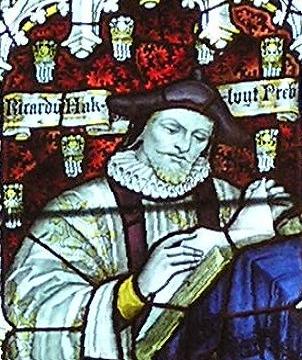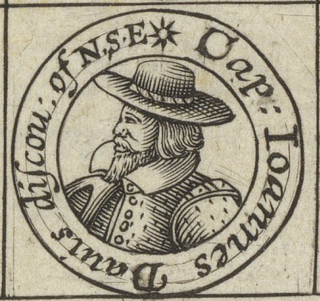Related Research Articles

Richard Hakluyt was an English writer. He is known for promoting the English colonization of North America through his works, notably Divers Voyages Touching the Discoverie of America (1582) and The Principal Navigations, Voyages, Traffiques and Discoveries of the English Nation (1589–1600).

John Davis was one of the chief navigators of Queen Elizabeth I of England. He led several voyages to discover the Northwest Passage and served as pilot and captain on both Dutch and English voyages to the East Indies. He discovered the Falkland Islands in August 1592.
Nennius is a mythical prince of Britain at the time of Julius Caesar's invasions of Britain. His story appears in Geoffrey of Monmouth's History of the Kings of Britain (1136), a work whose contents are now considered largely fictional. In Middle Welsh versions of Geoffrey's Historia he was called Nynniaw.
Sir Andrew Barton was a Scottish sailor from Leith. He gained notoriety as a privateer, making raids against Portuguese ships. He was killed in battle and memorialised in English and Scottish folk songs.

The Golden Age of Piracy is a common designation for the period between the 1650s and the 1730s, when maritime piracy was a significant factor in the histories of the North Atlantic and Indian Oceans.

Bartholomew Sharp was an English buccaneer and privateer. His career of piracy lasted seven years (1675–1682). In the Caribbean he took several ships, and raided the Gulf of Honduras and Portobelo. He took command of an expedition into the Pacific and spent months raiding settlements on the Pacific Coast of South America including La Serena which he torched in 1680. His flagship, taken at Panama, was the Trinity.
The Sea Voyage is a late Jacobean comedy written by John Fletcher and Philip Massinger. The play is notable for its imitation of Shakespeare's The Tempest.
The Island Princess is a late Jacobean tragicomedy by John Fletcher, initially published in the first Beaumont and Fletcher folio of 1647.

Supriya Chaudhuri is an Indian scholar of English literature. She is Professor Emerita at Kolkata's Jadavpur University.

The Antipodes is a Caroline era stage play, a comedy written by Richard Brome c. 1636. Many critics have ranked The Antipodes as "his best play...Brome's masterpiece," and one of the best Caroline comedies – "gay, imaginative, and spirited...;" "the most sophisticated and ingenious of Brome's satires." Brome's play is "a funhouse mirror" in which the audience members could "view the nature of their society."

The Fair Maid of the West, or a Girl Worth Gold, Parts 1 and 2 is a work of English Renaissance drama, a two-part play written by Thomas Heywood that was first published in 1631.
Fortune by Land and Sea is a Jacobean era stage play, a romantic melodrama written by Thomas Heywood and William Rowley. The play has attracted the attention of modern critics for its juxtaposition of the themes of primogeniture and piracy.
The Islands Voyage, also known as the Essex-Raleigh Expedition, was an ambitious, but unsuccessful naval campaign sent by Queen Elizabeth I of England, and supported by the United Provinces, against the Spanish Empire and Portuguese Empire of Philip II from the House of Habsburg during the Anglo–Spanish War (1585–1604) and the Eighty Years' War.
Clinton Atkinson was a 16th-century British pirate, active in the 1580s in the sea surrounding Devon and Cornwall in southwestern Britain.
Jowitt is a surname. Notable people with the surname include:
Stephanus Parmenius was a Hungarian scholar and humanist poet who traveled to Oxford and became involved in the English exploration of the New World. He joined Humphrey Gilbert's expedition to North America with the intention of writing a chronicle of the voyage and its discoveries. Parmenius reached Newfoundland, likely becoming the first Hungarian in the New World. However, he died on the return voyage in 1583 when his ship was lost at sea.
Nandini Das is professor of Early Modern Literature and Culture in the English faculty at the University of Oxford. She is a specialist in Shakespeare studies, Renaissance romance writing, early travel literature, and encounters between different cultures.
Helen Smith is a scholar of English literature. She is Professor of Renaissance Literature and Head of the Department of English and Related Literature at the University of York.

Drake's Assault on Panama also known as the Defence of Panama was a military event that took place in January 1596 during the Anglo–Spanish War. An English expedition under the command of Francis Drake and Thomas Baskerville attacked the Spanish Main via Nombre de Dios in order to cross the isthmus of Panama. Ravaged with dysentery and other diseases the English were repelled and defeated. Drake would die of the former and the expedition was forced to retreat back to England all the while harassed by the Spanish.
References
- ↑ "Professor Claire Jowitt". University of East Anglia. Retrieved 5 February 2016.
- ↑ Claire Jowitt at University of Southampton (Accessed Dec 2012)
- ↑ "ABSTRACT: 'Inward' and 'Outward' Jews: Margaret Fell, Circumcision, and Women's Preaching". Archived from the original on 18 July 2011. Retrieved 9 December 2010.
- 1 2 [ dead link ]
- ↑ "Macmillan: Pirates? The Politics of Plunder, 1550-1650: Claire Jowitt: Books". Archived from the original on 29 May 2010. Retrieved 9 December 2010.
- ↑ http://projects.chass.utoronto.ca/emls/si-16/jowiarca.htm "Et in Arcadia Ego": The Politics of Pirates in the Old Arcadia, New Arcadia and Urania, Claire Jowitt, Early Modern Literary Studies Special Issue 16 (October 2007) 5.1–36
- ↑ The Richard Hakluyt 'Principal Navigations' editorial project, National Maritime Museum, 2008, archived from the original on 3 June 2011, retrieved 23 March 2011.
- ↑ "The Hakluyt Edition project is preparing a 14-volume critical edition of Richard Hakluyt's The Principal Navigations (1598–1600) for Oxford University Press". The Hakluyt Edition Project. Retrieved 9 February 2016.
- 1 2 Carey, D.; Jowitt, C., eds. (2012). Richard Hakluyt and Travel Writing in Early Modern Europe. Ashgate. ISBN 9781409400172.
- ↑ "Secretaries, 1967 - Present". Society for Renaissance Studies. Retrieved 5 February 2016.
- ↑ "List of Fellows". The English Association. Retrieved 5 February 2016.
- ↑ "Scouloudi Historical Award recipients 2011". Institute of Historical Research. University of London. Retrieved 5 February 2016.
- ↑ Aune, M. G.. (2006) 'Book Review: Claire Jowitt. Voyage Drama and Gender Politics 1589–1642: Real and Imagined Worlds. Manchester: Manchester University Press, 2003.'. Early Theatre 9.1: 145–8
- ↑ TLS (2003) In Brief – Voyage Drama and Gender Politics, 1589–1642 by Claire Jowitt, Reviewed in the Times literary supplement. no. 5214,: 30
- ↑ Brennan, Michael G.(2004) Voyage, Drama and Gender Politics 1589–1642: Real and Imagined Worlds, Reviewed by Notes and Queries, 51, no. 1 (2004): 86–87
- ↑ Claire Jowitt, Voyage Drama and Gender Politics 1589–1642 Reviewed in Literature & history. 13, Part 2 (2004): 91
- ↑ Laycock, Kelly (2003) Voyage Drama and Gender Politics 1589–1642: Real and Imagined Worlds by Claire Jowitt; Reviewed in Renaissance and Reformation. 27, no. 1,: 125
- ↑ Brennan, Michael G. (2008) Pirates? The politics of plunder, 1550–1650 Claire Jowitt (ed.), Reviewed in Notes and Queries Volume 55, Issue 3, Pp.366–368.
- ↑ Risso, P (2007) Claire Jowitt (ed.), Pirates? The Politics of Plunder, 1550–1650 – Reviewed in International Journal of Maritime History, 19, no. 2: 485
- ↑ Merrett, Robert James (2009) Pirates? The Politics of Plunder, 1550–1650 Edited by Claire Jowitt, Reviewed in Renaissance and Reformation. 32, no. 2, (2009): 124
- ↑ Döring, Tobias (2008) Pirates? The Politics of Plunder, 1550–1650 by Claire Jowitt Reviewed in Journal for the study of British cultures. 15, no. 1,: 80
- ↑ http://www.history.ac.uk/fellowships/awards/scouloudi Institute of Historical Research Scouloudi Publication Award for "The Culture of Piracy 1580 – 1630: English Literature and Seaborne Crime" (Accessed March 2011)